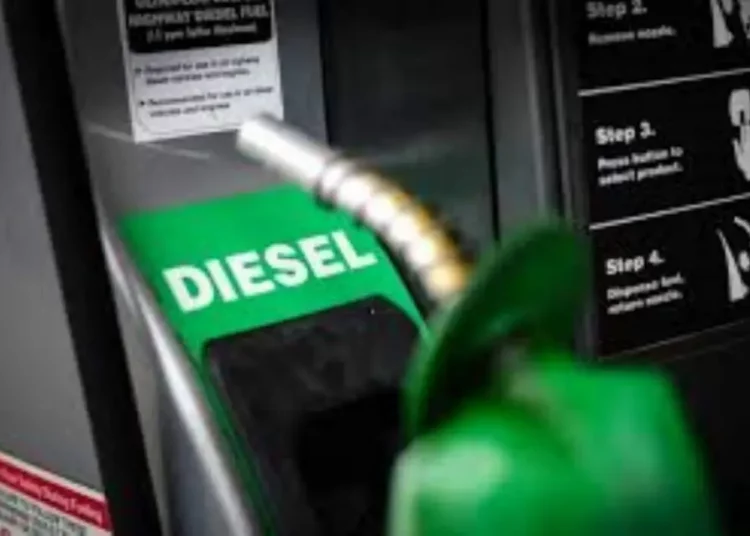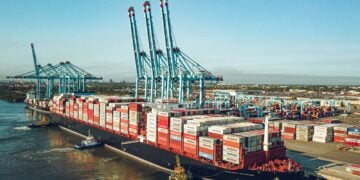The recent deals between Ukraine and Russia which will allow Kyiv to resume exports of grain through the Black Sea, has also seen respite in escalating price of Automotive Gas Oil, AGO also called diesel, across states in the country.
The agreement will allow millions of tonnes of grain, currently trapped in Ukraine by the war, to be exported as the world shortage of Ukrainian grain since Russia’s 24 February invasion has left millions at risk of hunger.
On the other hand, the crisis, which has shot up prices of diesel, thereby, impacting local businesses, is beginning to relax as checks by LEADERSHIP reveals marginal drop in the price of the product.
Our correspondent reports that, currently the product sells at about N713.50 per litre in Lagos. This is against N800 a litre it was sold between March and April this year which prompted the Manufacturers Association of Nigeria (MAN) to seek an urgent intervention from the federal government to support the production of goods. This indicates an 11 per cent drop in the price of diesel prior to now.
Though available data at our disposal shows that the price of diesel goes for N720 a litre in Port Harcourt, in Delta state, a liter sells for N715 and in Calabar, the product is sold at N725.
A major marketer who craved anonymity said marketers have escalated importation of the product since a deal between Russia and Ukraine allowed wheat export from the Black Sea.
Our source predicted a further decline in the price following relaxation of import restrictions resulting from the war.
At the heat of the crisis, MAN decried the rising cost of diesel in the country and urged the federal government to issue its members licences to import the product from the Republic of Niger and Chad.
The association had called on the federal government to avert the total shutdown of production operations. MAN represents more than 3,000 manufacturers spread across 10 sectors, 76 sub-sectors, and 16 industrial zones and the sector, which dominates export trade in the West African sub-region, employs more than five million workers, directly and indirectly, and contributes 8.46 per cent to the nation’s Gross Domestic Product (GDP).
The Association noted that the call was pertinent during times of crisis to enhance the performance of the sector through a pro-manufacturing policy that would encourage scale-up and lower unit cost of production.
The MAN listed its challenges to include high operating cost caused by the twin problem of inadequate electricity supply and the high cost of alternative energy sources and the more than 200 per cent increase in the price of diesel had become a major constraint with spiral effects.
“MAN is greatly concerned about the implications of the over 200 per cent increase in the price of diesel on the Nigerian economy and the manufacturing sector in particular.
“More worrisome is the deafening silence from the public sector as regards the plight of manufacturers,’’ its director-general, Mr. Segun Ajayi-Kadir, complained.
Ajayi-Kadir urged the government to strengthen the nation’s economic absorbers from external shocks to reduce the myriad challenges the manufacturing sector was already beguiled with.
He stated that by the time the current domestic reserve of manufacturing inputs was exhausted, prices of manufactured products would soar in the face of an acute shortfall in supply.
Ajayi-Kadir added that government should continue to support manufacturing to accelerate the process of recovery from the aftermath of COVID-19 and previous bouts of recession.
This, he explained, would avert a complete shutdown of factories nationwide.
He urged the government to issue licenses to manufacturing concerns and operators in the aviation industry to import diesel and aviation fuel directly to avert the avoidable monumental paralysis of manufacturing.
Ajayi-Kadir also called for the removal of VAT on diesel as an instant stimulus for an immediate price reduction and expedite action in reactivating or privatising petroleum products refineries in the country.
“As a matter of urgency, the government should address the challenge of repeated collapses of the national grid which is causing acute electricity shortage, especially for manufacturers,’’ he stressed.
Meanwhile, MAN has also asked the federal government to issue its members licences to import diesel from the Republic of Niger and Chad, Nigeria’s neighbouring countries, to avert the avoidable monumental paralysis of manufacturing activities that could arise from the total shut down of production operations.
MAN also tasked the government to develop a response strategy to address challenges emanating from the armed conflict between Russia and Ukraine.
It said: “In light of the gravity of the precarious situation that we have found ourselves as a nation and the looming dangers ahead, the expectations of manufacturers in Nigeria are as follows: that government should urgently allow manufacturers and independent petroleum products marketing companies to also import AGO (diesel) from the Republic of Niger and Chad by immediately opening up border posts in that axis to cushion the effect of the supply gap driven the high cost of AGO (Automotive Gas Oil).”
The association also requested the government to “issue licences to manufacturing concerns and operators in the aviation industry to import diesel and aviation fuel directly to avert the avoidable monumental paralysis of manufacturing activities arising from total shut down of production operations and movement of persons for business activities.”
Ajayi-Kadir noted that Nigerian manufacturers are greatly concerned about the implications of the over 200 per cent increase in the price of AGO on the Nigerian economy and the manufacturing sector.
It equally tasked the government to “address the challenge of the repeated collapse of the national grid (twice within a week), which is causing acute electricity shortage in the country, especially for manufacturers,” adding that government should “remove VAT on AGO as an instant stimulus for an immediate price reduction and expedite action in reactivating or privatising the petroleum products refineries in the country.”
Similarly, operators in transport and logistics businesses equally cried out over spike in the cost of diesel, saying the surge has drastically affected their operations.
The Bus Rapid Transport (BRT) operators in Lagos also shared their pain complaining that the hike had affected their operations.
Diesel Price To Rise On Increased Landing Cost – Depot Owners
Managing director of Lagos Bus Services Limited (LBSL), Idowu Oguntona, said: “we are currently consulting to see what can be done. The cost of diesel is very high. Our intention and objective is to continue to provide affordable mobility for Lagosians. But we are consulting on what can be done from the cost management perspective.
“Obviously adjusting the fare is the last resort. Not many people can absorb that, but we are consulting to see the best decision we can take for everyone.”
Managing director of Primero Transport Company, Fola Tinubu, said the spike had affected them negatively. “The diesel price has gone up by over 200 per cent while, there has not been an increase in fares or help from the government. We are struggling right now,” he said.
Tinubu said the company was currently surviving through help of its banker and vendors.
Former president Olusegun Obasanjo, had last month, complained that the skyrocketing price of diesel will make fish farmers stumble into bankruptcy.
Obasanjo decried that the state of the Nigerian economy was affecting the aquaculture sector, adding that fish farmers may ‘sink’.
Obasanjo who spoke at the congress of Southwest Fish Price Control Group Abeokuta, the Ogun State capital, stressed that farmers in the country need to come together if they want to survive in the economy.
Obasanjo further advised that fish farmers need to come together to avert looming economic disaster in the farming sector.





